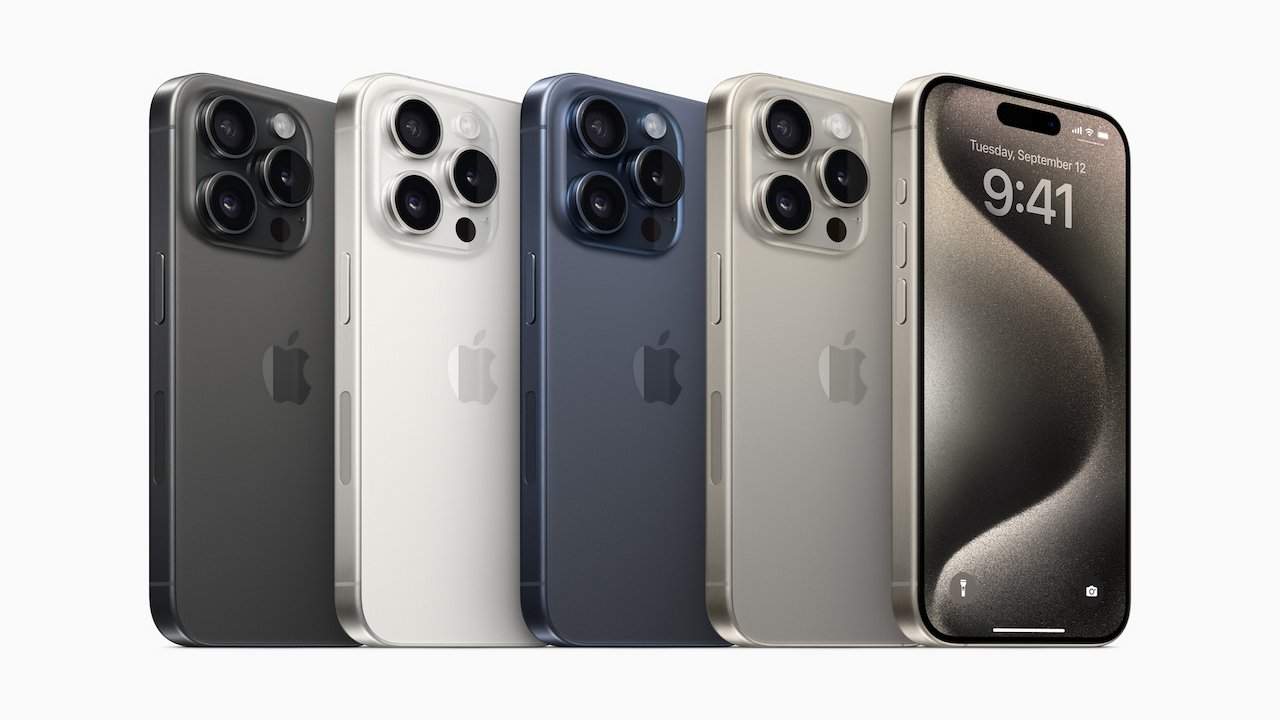iPhone sales drop in China's annual Singles Day sales
Figures for November 11's Singles Day in China show that sales of the iPhone dropped 4% year over year -- while Huawei smartphones grew 66% in the same period.

iPhone 15 Pro colorful lineup
Apple has often done well on Singles Day -- also known as Double 11 because of the 11/11 date -- and according to Reuters, retailer JD.com reported selling $1.39 billion of Apple products in this year's event.
The sales data plus both Apple's percentage drop and Huawei's percentage increase were reported to Reuters by Counterpoint Research. Percentage comparisons are not especially useful without the full figures and JD.com did not break down its figures into even what were iPhones or other Apple devices.
Plus China's other main retailers have ceased reporting Singles Day sales figures, so it's not possible to compare this year and previous ones.
However, as well as Apple's iPhone having a 4% drop and Huawei seeing a 66% increase, Xiaomi also grew 28% year over year. So Chinese brands are at the very least ascending in the country, and it appears their sales are taking market share from Apple.
Xiaomi has reported that it sold $3.14 billion of what it described to Reuters as cumulative gross merchandise value. Neither Huawei nor Apple have commented.
Separately, Counterpoint Research has also reported that the iPhone 15 has helped global smartphone sales break their 27-month series of declines.
Read on AppleInsider

Comments
And they state one brand showing a 66% increase and another at 28% — an increase from what? And were discounts offered that contributed to these increases?
If the goal was to report on changing trends, they failed miserably — you can’t determine trends without more data points than what they’re presenting.
And how exactly does Counterpoint get sales data, and how can it be verified that it is correct? Can’t you see how easily this can be manipulated to make a brand look good or bad?
Huawei surged 66 percent and sold 800k phones…
notice how they don’t give the actual numbers?
"Percentage comparisons are not especially useful without the full figures and JD.com did not break down its figures into even what were iPhones or other Apple devices.
Plus China's other main retailers have ceased reporting Singles Day sales figures, so it's not possible to compare this year and previous ones."
Not to mention that we are talking about sales for one day here.
Taken 'as is' there is little to see. It's like when, every year, we see the 'iPhone is the world's top selling model even though other companies could be selling more handsets.
In this case, things only start to have some significance when you try to tie things in with other, similarly sketchy (in terms of absolute numbers) reports and what manufacturers are actually reporting.
Consensus seems to be that since late August, Huawei has been impacting iPhone sales in the region.
Apple has been able to sell into China, Japan and South Korea, because those countries are so competitive with each other no one wants to be seen with a product from one of the other countries if you’re from that country, Apple is that second go to device/devices in each one of those countries. Not many Japanese wanna be seen with the Samsung or a Chinese smartphone if they can help it, guess which brand they’re buying? And the same as happening in reverse in China and South Korea, the market in East Asia, among those three countries for Apple is bigger than all Europe put together.
I'll take advantage of the moment to clarify something I wrote earlier. It seems (at least with the Counterpoint data) that the Singles Day numbers refer to a two-week period rather than the day itself (11/11).
I'm sure that Huawei "surged", given it's almost lifeless status in the handset market, and while it is likely taking some sales from Apple in China, it is more likely taking sales from other Android OS handsets. Given how poorly China's economy is doing currently, I wouldn't expect handset sales to make much headway.